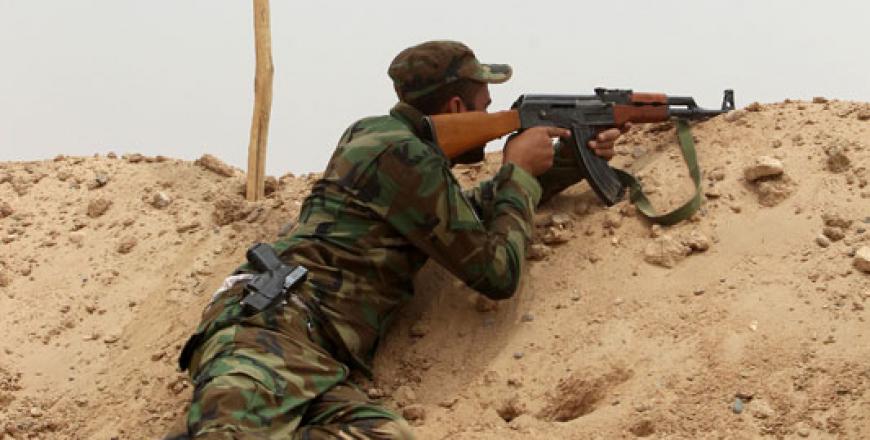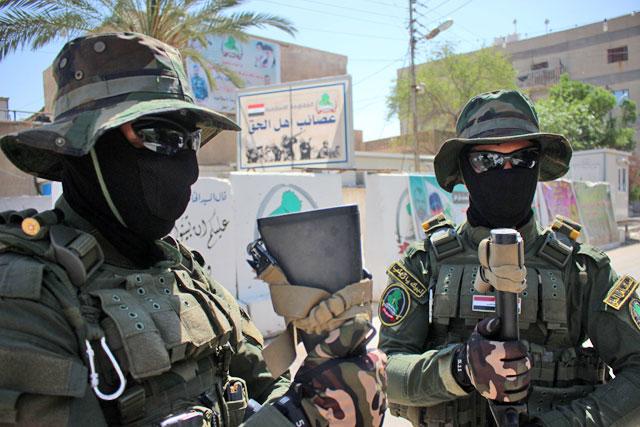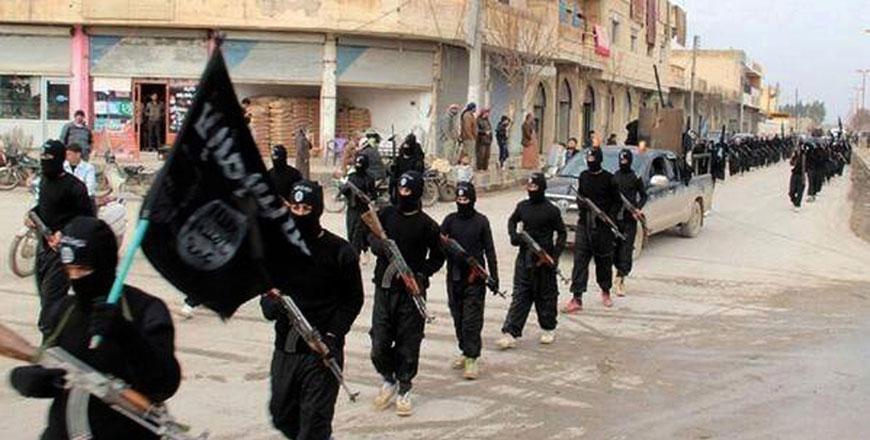You are here
Daesh suicide attackers slow Iraq’s Ramadi counter-attack
By AFP - Jun 01,2015 - Last updated at Jun 01,2015

An Iraqi Shiite fighter from a Popular Mobilisation Units holds a position on the edge of Anbar province, 120km northwest of Baghdad, on Monday (AFP photo)
BAGHDAD — A huge suicide attack on an Iraqi police base killed at least 37 people Monday as an operation against the Daesh group continued but looked far from retaking Ramadi.
In Syria, the jihadists kept expanding their self-proclaimed caliphate after weekend gains against both government forces and rival rebels.
A suicide bomber blew up his explosives-laden vehicle at a police base in Iraq's Salaheddin province, killing at least 37 people and wounding more than 30, officers said.
"They are mostly policemen," said a doctor at the main hospital in the nearby city of Samarra where the casualties were brought.
Some police officers said the suicide attacker used a tank to muscle his way into the police base, located between Samarra and Tharthar lake, northwest of Baghdad.
The area is being used as part of a military operation aimed at cutting off the Daesh terror group's supply lines in the Anbar province of western Iraq.
Daesh fighters have in the past year seized a formidable arsenal of military vehicles, weapons and ammunition from retreating Iraqi forces.
Prime Minister Haider Al Abadi said Sunday that Iraq had lost 2,300 Humvee armoured vehicles during the fall of second city Mosul a year ago.
The jihadists’ latest haul came on May 17 when they captured Ramadi, the capital of Anbar which government and allied tribal fighters had managed to defend for more than 12 months.
The debacle of the security forces prompted Abadi to call in the Hashed Al Shaabi, an umbrella organisation which includes Iran-backed Shiite militias that Baghdad and Washington had been reluctant to involve in the Sunni bastion of Anbar.
Daesh gains in Syria
A counter-offensive was launched but Iraqi forces have either stopped on the outskirts of Ramadi or focused efforts on outlying areas in and around Anbar to sever the jihadists’ supply lines.
Daesh used an unprecedented number of massive truck bombs to blast its way to government strongholds in Ramadi and it has continued to unleash suicide vehicle-borne bombs on a daily basis since.
Abadi vowed after the stinging setback he suffered in Ramadi that his troops would wrest it back within days, but he has also admitted the truck bombs were keeping government forces from entering the city.
The capture of Ramadi coincided with Daesh’s takeover of Palmyra in Syria, in what appeared to swing the momentum in the jihadists’ favour after months on the back foot.
On Monday, Daesh advanced towards Marea, a village between Aleppo and the Turkish border.
The Syrian Observatory for Human Rights said Daesh expanded its control in Aleppo province at the weekend, at the expense of rival rebel groups.
The jihadists also gained ground in northeastern Syria, where a suicide bomber killed “at least nine regime loyalists” near Hasakeh, the observatory said.
Daesh also ousted government forces from areas in the central province of Homs.
“The road is now open [for Daesh] from Palmyra to Anbar province in Iraq, without any obstacles,” said activist Mohammed Hassan Al Homsi.
Rising death toll
Geographer and analyst Fabrice Balanche said that across Iraq and Syria, the jihadist group now controlled nearly 300,000 square kilometres, an area the size of Italy.
The multiple offensives by Daesh resulted in a surge of casualties across Syria and Iraq in May.
The observatory said it had recorded the deaths of at least 6,657 people last month, the highest number this year.
In Iraq, the health governorate in Anbar reported at least 102 civilian deaths in May alone.
The United Nations said even partial figures not covering the areas worst affected by conflict showed at least 665 civilians were killed last month.
Aid agencies are preparing to launch a fundraising appeal for half a billion dollars for the crisis in Iraq, UNICEF said.
“Five hundred million is really the bare minimum. We’re cutting it down to the bare bone,” said Philippe Heffinck, the representative of the UN’s children’s agency in Iraq.
According to the UN, 2.9 million people have been displaced by violence in Iraq since the start of 2014 and almost four times as many have been forced from their homes in Syria since the conflict started there more than four years ago.
Related Articles
Shiite militias converged on Ramadi Monday to try to recapture it from jihadists who dealt the Iraqi government a stinging blow by overrunning the city in a deadly three-day blitz.
BAGHDAD — Iraqi officials voiced fears Wednesday that jihadists will use their seizure of a dam in Ramadi to mount fresh attacks on pro-gove
BEIRUT — Daesh fighters tightened their grip on the historic city of Palmyra in Syria, days after capturing a provincial capital in neighbou

















